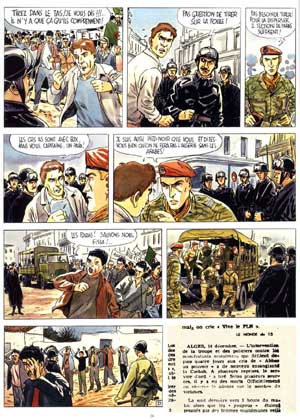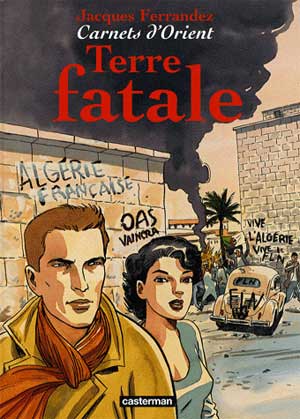Comics /
European Comics
Carnets d’Orient : Terre fatale
By Hervé St-Louis
January 17, 2010 - 22:10
Terre fatale (
Fatal Homeland) is the latest and possibly the last volume of the ten volumes
Carnets d’Orient series by French cartoonist Jacques Ferrandez which covers the history of Algeria from the moment the French settled in the 19th century up to the independence of that country in 1962. Using one family, Ferrandez shows what happens to Algeria from its colonial French golden age to the civil and colonial war of independence that shaped this society and the French people who could not conceive that Algeria was not a native part of France.
I remember arguing with other comic book readers years ago that James Robinson’s
Starman series was nothing compared to the saga weaved by Ferrandez in
Carnets d’Orient. I could not imagine how anyone who knew about comic books could even begin to compare the two. One is a revisionist story reinterpreting the super hero genre in post modern tones. The other a literal saga and epic story mixing historical research and narrative with a fictional family and its involvement in a French colonial experiment. There was just no way
Carnets d’Orient, with is humanist overview of life could even be put at the same level of something that focused on the narrow umbilical fetish for men in tights.
 |
Well, Ferrandez let me down with this volume. It felt like he just wanted to end the story and so he covers entire years with but a few pages. The effect is that it feels more like a didactic lesson on Algerian and French history than an epic story involving men and women that love each other, hate people of other cultures and fight for the same land. Such a premise should have been something universal as we have seen that story before. But it wasn’t and although the betrayal of Octave should have been the high point of the story, the briefness of the affair in the story was uneventful. Truly, there was no epic in this story, which was supposed to cap the entire ten volumes saga. Perhaps Ferrandez felt that he had spent too much time chronicling the war of independence in Algeria - he did spend the last four volumes covering but a few years. Perhaps he wanted to move on to other project, instead of the one that gave him the recognition of the industry as a great cartoonist. I haven’t read any of the volumes between volume four (
Le Centennaire) and this one. Perhaps something changed in how Ferrandez depicts his characters. I don’t know. But will say that I did not enjoy this release as much as I did the first four.
The artwork in this series is more polished than I remember and I blame that squarely on digital comic book production methods. Newspaper clippings used to be mixed in with artwork and charcoal drawings with dirty and bleeding water colours. All of that imperfection is gone and made much more clean and concise in this volume. There are still water colours, but they are now the only imperfections that made past volume breathe with life and uniqueness in the past. I’m not going to bemoan this change in production, as it makes the release and publication of books much more easier than before. Still Ferrandez has a unique style and approach to comic book storytelling which makes me drunk with passion and appreciation. There’s a reason he’s still a favourite of mine and I’ll take one of his “expresso” stories over any
Starman volume every time.
Rating: 8.5 /10
Last Updated: January 17, 2025 - 08:20

